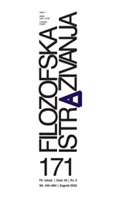Ima li u odgoju mjesta za ljubav? Vuk-Pavlovićeva kritika Maxa Schelera
Is There a Place for Love in Education? Pavao Vuk-Pavlović’s Critique of Max Scheler
Author(s): Tomislav Dretar, Ivana ZagoracSubject(s): Ethics / Practical Philosophy, Contemporary Philosophy, Sociology of Education, Philosophy of Education, Pedagogy
Published by: Hrvatsko Filozofsko Društvo
Keywords: Max Scheler; Pavao Vuk-Pavlović; education; love; values; transformation; role models in education;
Summary/Abstract: In his most significant work in the field of philosophy of education, Personhood and Education (1932), Vuk-Pavlović criticizes Schelerʼs claim that love cannot be an educational principle. According to Vuk-Pavlović, this claim is based on Schelerʼs two misconceptions: the first is related to Schelerʼs misunderstanding of education, and the second to his misunderstanding of love. In this text, we examine aspects of Vuk-Pavlovićʼs criticism and ask a broader question about the potentials and limits of love in education. When defining the concept of love, Scheler indeed opposes it to education, which for him implies changing the object of education. In this sense, education is an attempt to change the person being raised. On the other hand, according to Scheler, love means accepting the loved one without trying to change him. Therefore, the purpose of love is not to transform the loved object. However, through a genuine act of love, Scheler claims, change can occur as the appearance of higher values. Schelerʼs criticism of education is based on the understanding of education in the negative sense of imposing external values, where the individuality and value potential of the one being educated is not recognized. With regard to the aforementioned conception of love, one could theorize about a different type of education, which implies love in the sense of the development of one’s self.
Journal: Filozofska istraživanja
- Issue Year: 43/2023
- Issue No: 03/171
- Page Range: 553-566
- Page Count: 14
- Language: Croatian

